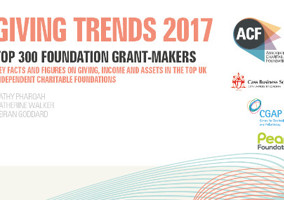Foundations and grantmaking bodies have “collectively chosen a very limited set of tools from those available” to address community inequality across the UK, according to the chief executive of a major giver.
Speaking at the Association of Charitable Foundation's Giving Trends 2018 report launch in London yesterday, Julian Corner of Lankelly Chase issued a challenge to the UK’s foundations sector.
He said foundations have “more freedom” than local or national government to alleviate issues around systemic inequality in certain areas of the UK, but have persisted in using what he called “spot funding”.
He said instead that place-based giving schemes could prove to be a “potentially important use of charitable funders’ position in the civil society ecosystem” but warned it was not a “silver bullet” to fix all the issues facing the sector.
In its latest report, the ACF said that “place-based working does not have one single definition but describes a style and philosophy of approach that seeks to deliver more holistic and collaborative solutions to social issues in a local area”.
‘Our cold spots, not theirs’
Corner said that a place-based approach to funding could help foundations move beyond “reactive grantmaking as the sole means of supporting communities” and address the “vicious cycle” currently facing some communities in so-called funding “cold spots”.
“There has been some attempt by foundations and grantmakers to respond to so-called ‘cold spots’ in funding. Where you identify a number of high-need communities that aren’t receiving funding. This is a vicious cycle, whereby these communities lack a strong organisation to make strong applications to foundations, so they receive less investments and, as a result, are less likely to have strong organisations and so on.
“It’s an attempt to move beyond reactive grantmaking as the sole means of supporting communities. Not least because there’s not much evidence that these are actually ‘cold spot’ communities. That these are our cold spots, not theirs.”
He said years of austerity have illuminated how interconnected and complex the issues are facing foundations and that the Brexit vote helped demonstrate the “growing unease with national decisions being made about local issues, and of remote power and decision makers reinforcing unequal power dynamics”.
Corner also warned that some foundations are in danger of being seen as “colluding with the narrative that says that these communities need to pull themselves up by their bootstraps”.
‘Longevity, flexibility and independence’
Corner said that only foundations have the “longevity, flexibility and independence” to successfully implement place-based funding streams.
However, sharing experiences from some of his own organisations’ forays into this space, Corner said that it required a completely different organisational mentality to more traditional forms of grant-making.
Place-based approaches require foundations to “think very differently about governance” and a change in approach to impact measurement, instead focusing on “learning about how to be effective in very different environments”.
However, Corner concluded that “we have more freedom to be who we need to be than any other actors in the community sector sphere. That suggests to me it is our very freedom that we should be honouring and rising to this challenge, daring ourselves to dream a little.”
|
Related Articles












